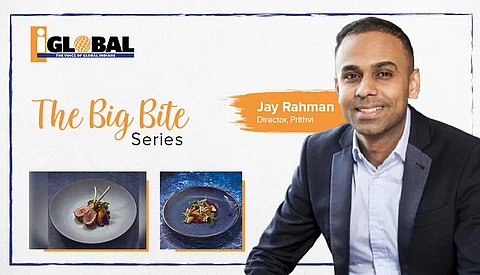

“Consistency is the key to our legacy,” says Jay Rahman, Director of fine-dining restaurant Prithvi, based in Cheltenham in England’s Gloucestershire county.
Since it opened to diners over eight years ago, the restaurant has gone on to achieve the top spot among hundreds of restaurants in Cheltenham.
Prithvi, which in Sanskrit translates as “Earth” or “Mother Earth”, prides itself for offering a memorable dining experience that goes beyond just good food and wine, serving up a refined and modern twist on classic Indian dishes.
Rahman, who also owns Holee Cow and Bhoomi Kitchen with business partner Michael Raphel as part of JM Socials Ltd, brings his years of experience to his restaurants and here, as part of ‘iGlobal’s’ regular Big Bite Series, he reflects on why every little detail matters.
Rahman said: “The inspiration for Prithvi came from my experience and knowledge that I have gained with several hotel chains and independent restaurants, from the high-end to the very casual.
“I have combined all of this, and as with any business, it requires trying to find out what the current market needs and what people enjoy. It took very little time once Prithvi opened in February 2012 that our business was thriving by April that year.”
As a winner of the TripAdvisor Travellers’ Choice 2020 and among the top rung of restaurants worldwide, the restaurant has moved into new territories, offering a takeaway service “Prithvi at Home” – a first for the business. And, in keeping with the constraints of the coronavirus lockdown, the restaurant kept in close contact with diners through its social media channels.
He reflects: “Facebook and Instagram are at the core of what we do. We communicated through these channels, letting the public know what we are doing and keeping the brand alive.
“The coronavirus pandemic hasn’t destroyed us, and we will come back stronger and wiser on how to do things differently, but for the better.”
The restaurant, which re-opened from July 4 under the government’s Covid-secure guidance, has since been fairly busy with diners eager to experience the dine-out experience once again.
With the winter festive season soon approaching, Rahman notes: “We will be celebrating these joyous occasions, as we have usually done with all festivities. We tend to decorate the restaurant but in a very discreet way, where one notices it because they have an eye for it.”
And on the support provided by the government to an embattled hospitality sector, he adds: “The furlough scheme which they provided was superb. It helped independent and larger businesses to sustain and keep employing people and kept our hopes up. But as soon as that ends, it is going to be a disaster.”
The restaurateur believes more needs to be done to understand and meet the requirements of the industry.
He explains: “I think the government has done something that fits all sizes, but they cannot compare an independent restaurant with a restaurant that serves food via a pub.
“Every hospitality service is run differently. More needs to be done with particular measures in place for every sector. For example, the local council and a dine-in restaurant can work with each other to identify the restaurants who do have the ratings, who have the understanding of Covid-19 rules, and restaurants who support local markets.”
As the world begins to adapt to a new normal, Rahman believes the long-term impact Covid-19 will have on the hospitality industry could see restaurants disappearing, causing many job losses. He urges the government to take on board expert advice from the industry to avert large-scale losses to business and the economy.
In reference to JM Socials as a whole, he notes: “We operate a number of restaurants in the group. We are currently looking into different concepts, like brasseries that will serve all-day – breakfast, lunch, and dinner. We have had lots of thoughts on expansions and continue to be careful about where we go, how we operate, and the size to which we expand.”
On a more nostalgic note, Rahman bemoans that things have lost personality as a result of the pandemic.
“Hospitality is about socialising, greeting, and welcoming. But with everything that is happening, that becomes hard to do. There’s very limited communication, no facial expressions, limited eye contact – there is no hospitality, and it is one of the worst things that is happening right now.”